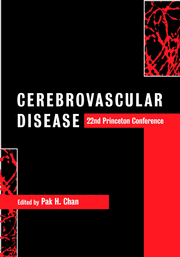Book contents
- Frontmatter
- Contents
- List of contributors
- Preface
- Acknowledgments
- Part I Special lectures
- Part II Oxidative stress
- Part III Apoptosis
- Part IV Hot topics
- Part V Hemorrhage, edema and secondary injury
- Part VI Inflammation
- Part VII Gene transfer and therapy
- 22 Adenoviral vectors for gene therapy in stroke
- 23 Gene transfer of glial cell line-derived neurotrophic factor prevents ischemic brain injury
- 24 Vasomotor effects of nitric oxide, superoxide dismutases and calcitonin gene-related peptide
- Part VIII Neurogenesis and plasticity
- Part IX Magnetic resonance imaging in clinical stroke
- Part X Risk factors, clinical trials and new therapeutic horizons
- Index
- Plate section
22 - Adenoviral vectors for gene therapy in stroke
from Part VII - Gene transfer and therapy
Published online by Cambridge University Press: 02 November 2009
- Frontmatter
- Contents
- List of contributors
- Preface
- Acknowledgments
- Part I Special lectures
- Part II Oxidative stress
- Part III Apoptosis
- Part IV Hot topics
- Part V Hemorrhage, edema and secondary injury
- Part VI Inflammation
- Part VII Gene transfer and therapy
- 22 Adenoviral vectors for gene therapy in stroke
- 23 Gene transfer of glial cell line-derived neurotrophic factor prevents ischemic brain injury
- 24 Vasomotor effects of nitric oxide, superoxide dismutases and calcitonin gene-related peptide
- Part VIII Neurogenesis and plasticity
- Part IX Magnetic resonance imaging in clinical stroke
- Part X Risk factors, clinical trials and new therapeutic horizons
- Index
- Plate section
Summary
Introduction
Over the past decade, knowledge in two areas has been converging toward a new era in the treatment of acute cerebral injuries such as stroke. From one direction, there have been remarkable new insights into the basic mechanisms at the molecular, cellular and tissue levels that cause ischemic brain injury and the repair processes that follow the acute injury. From another area of science, there have been major advances in our ability to introduce foreign genes into cells and cause the expression of specific proteins that affect tissue function. Knowledge in these two areas will inevitably result in the use of gene therapy to treat strokes.
While clinical trials of gene therapy in stroke are not imminent at the time of writing, the ground work is being established through studies using experimental animals and through efforts to perfect gene delivery vehicles known collectively as vectors. The purpose of this report is to review the development of a particularly promising vector, the adenovirus, and to outline some of the logistical issues that must be addressed before adenoviral vectors can be used in humans to treat stroke.
The adenovirus
The use of viruses to deliver genes to cells in vivo has progressed to the point where numerous clinical trials have been approved and many are ongoing. The most commonly used viruses for gene therapy are retroviruses, herpes simplex viruses and adenoviruses.
- Type
- Chapter
- Information
- Cerebrovascular Disease22nd Princeton Conference, pp. 261 - 268Publisher: Cambridge University PressPrint publication year: 2002



